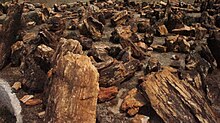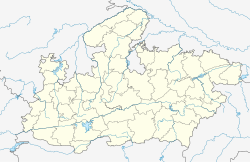Ghughua Fossil Park is a National Park, located near Shahpura in Madhya Pradesh, India, in which plant fossils belonging to 31 genera of 18 families have been identified.[2]
| Ghughua Fossil Park | |
|---|---|
| Type | National park |
| Location | Madhya Pradesh, India |
| Coordinates | 23°6′38″N 80°36′51″E / 23.11056°N 80.61417°E |
| Area | 75 acres (0.30 km2)[1] |



The site was founded during the 1970s by Dr. Dharmendra Prasad, a statistical officer of the Mandla district and honorary secretary of the district archaeology unit. It was declared a National Park in 1983.[3] Numerous plant, leaf, fruit, seed, and shell fossils can be found in this park, some of which date as far back as 65 million years,[3] the most prominent of which are the palm fossils.[2]
Notable fossils
editA fossil wood bearing some similarities to eucalyptus found at Ghughua may be the oldest fossil of its type ever discovered. This find would support a gondwanan paleodistribution.[4] Additional notable discoveries include a dinosaur egg fossil.[5]
Transportation
editGhughua Fossil Park is located near National Highway 11. It is situated 14 km from Shahpura and 76 km from Jabalpur.[2]
See also
editReferences
edit- ^ "Dindori district - Points of Interest". Retrieved 24 December 2021.
- ^ a b c "Fossil National Park Ghughua (65 Million Year Old Heritage)". National Information Centre. Archived from the original on 25 February 2013. Retrieved 26 December 2012.
- ^ a b Mishra, Girima (17 January 2010). "A dino egg and other fossils". The Indian Express. Retrieved 26 December 2012.
- ^ Anumeha Shukla, R.C.Mehrotra, Antariksh Tyagi. "Research Communications" (PDF). Current Science Vol 103. No.1. 10 July 2012. Retrieved 26 December 2012.
- ^ Kumar, Vikas (21 February 2011). "6.5 crore-year-old fossil in Ghughua". The Sunday Indian. Archived from the original on 4 March 2016. Retrieved 26 December 2012.
